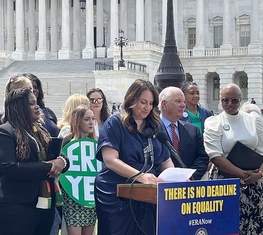League of Women Voters of Wisconsin v. Wisconsin Elections Commission
Case Summary
LWV Wisconsin filed a lawsuit in state court seeking a declaratory judgment to clarify Wisconsin state law concerning missing address information on absentee ballot return envelopes. The League also asked the court to require elections officials to provide notice and an opportunity to fix address errors that could lead to rejection of absentee ballots, and an order forbidding rejection of absentee ballots unless there was no witness address information on them.
Wisconsin law requires absentee ballots to be signed by the voters and a witness, who must fill in their address. Wisconsin statute section 6.87(6d) states, “If a[n absentee ballot] certificate is missing the address of a witness, the ballot may not be counted.” The term “missing address” is not explicitly defined in the statute.
A state court in a separate case, White v. Wisconsin Elections Commission, in which LWV Wisconsin intervened, banned officials from correcting or filling in incorrect or missing address information. Prior to this ruling, long-standing Wisconsin Elections Commission (“WEC”) guidance allowed local elections officials to fill in or correct missing or incorrect witness address information if they had sufficient evidence or knowledge of the correct address. Under such circumstances, elections officials were not required to contact voters and have them correct their witnesses’ addresses. Due to the court’s decision in White, the WEC withdrew its previous guidance, while the term ‘missing address’ for absentee ballots remained undefined.
In response to White, LWV Wisconsin filed a lawsuit in the Dane County circuit court, seeking the following relief.
- A declaratory judgment defining the term “missing address” to be a complete absence of any witness address information on an absentee ballot return envelope, i.e., left blank.
- A court order forbidding election officials from rejecting absentee ballots unless they were completely devoid of witness address information.
- A declaratory judgment stating section 6.87(6d) violates the Materiality Provision of the Civil Rights Act as applied to voters casting absentee ballots who filled out their street number, street name, and municipality but omitted information outside of these three categories.
- A declaratory judgment ruling the lack of a mandatory notice and cure process to correct witness address issues that could lead to rejection of absentee ballots violated procedural due process under the Fourteenth Amendment of the U.S. Constitution.
On January 2, 2024, the court granted LWV Wisconsin's motion for summary judgment on its Materiality Provision claim, ruling that election officials could not reject absentee ballots with:
- Witness certifications containing the witness’s street name, street number, and municipality, but not other address information such as state name or ZIP code.
- Witness certifications by a member of the voter’s household who lists a street number and street name, but omits other information, such as a municipality.
- Witness certifications using terms like “same” or “ditto” or other means to convey that their address is the same as the voter.
- Witness certifications with a street number, street name, and ZIP code, but no municipality.
LWV Wisconsin is represented by Law Forward, Inc. and Fair Elections Center.
Read LWV Wisconsin's press release here.
Read LWV Wisconsin's press release on the summary judgment ruling here.
LWV Timeline
LWV Wisconsin files lawsuit.
LWV Wisconsin files a state court lawsuit asking the court to define “missing address” for the purposes of witness address information. The League also requests court orders forbidding election officials from rejecting absentee ballots unless they are devoid of witness address information and for a notice and cure process for voter to fix such errors.
LWV Wisconsin files motion for temporary injunction.
LWV Wisconsin moves for a temporary injunction, asking the court to forbid election officials from rejecting ballots unless the witness address was completely absent, and requiring voters be given notice if their absentee ballots contained errors that could lead to their rejection.
Wisconsin Legislature intervenes in case.
Court denies temporary injunction in an oral ruling
Court partially grants defendant’s motion to dismiss
The court dismisses the League’s requests for a declaratory judgment and request for a temporary injunction. The court rules that because there was no allegation that the commission had taken harmful action on 6.87(6d), no controversy between the parties existed, meaning a declaratory judgment was inappropriate under the circumstances.
LWV Wisconsin moves for summary judgment
LWV Wisconsin moves for summary judgment on its claim that section 6.87(6d) violates the Materiality Provision of the Civil Rights Act of 1964.
Courts grants summary judgment
The court grants LWV Wisconsin's motion for summary judgment on its Materiality Provision claim, ruling that section 6.87(6d) violates the Materiality Provision of the Civil Rights Act of 1964.
Court of appeals denies request for stay
On appeal by the Wisconsin legislature, the Wisconsin Court of Appeals denies its request for the trial court's ruling on the Materiality Provision to be stayed.




